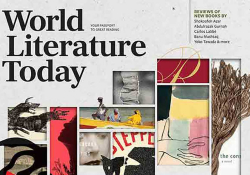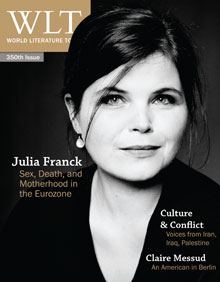
– Bernice G. Duncan, Assistant Editor, Books Abroad, 1952
Over the years, the editors of Books Abroad and, now, World Literature Today have seized the opportunity presented by milestone issues—our 100th in 1952, 200th in 1976, 250th in 1989, and, with this issue, our 350th in 2012—to reflect on the journal’s literary migration through the twentieth, and now the twenty-first, centuries. In the Summer 1936 issue, Books Abroad’s founding editor, Roy Temple House, looked back on “ten years of strenuous effort and frequent disappointment, of trial and error, of problem and perplexity,” wondering aloud how a fledgling journal, given away for free for the first five years, had survived during the early years of the Depression—in a time when the United States remained warily isolationist even as the tempest of war again threatened in Europe. House adamantly refused the temptation for the journal to become “the organ of any sort of propaganda, political, religious, economic, or any other”; the world need only be “reflected” in its pages, he cautioned, not “reformed” in them.
House continued at the helm of Books Abroad through 1949, passing the editorial torch to a succession of European émigrés, many of whom sought intellectual, if not political, sanctuary in the U.S. after the war. They all rallied around his idea that the journal should continue to feature “broad-minded, inclusive coverage of the world of letters.” In the 100th issue, internationally renowned Swiss philosopher Gustav Müller, who had joined the University of Oklahoma faculty in 1930, wrote: “Books Abroad has put the name of the University of Oklahoma on the map of the international Republic of Letters” (Winter 1952). That sentiment was echoed by Henri Peyre in the 200th issue: “Norman, Oklahoma, sounded to many a European ear as Persepolis or Samarkand once may have done to Marlowe or to Keats: the name of a remote, half fairy-like city from which the broadest-minded review in the world of letters radiated information, disseminated ideas, and appraised trends of taste” (Autumn 1976).
Fast-forward another thirty-five years, and we’ve since published another 150 issues—all told, some 53,000 pages of content since 1927, including almost 80,000 individually authored pieces (articles, book reviews, poems, short stories, and interviews) in the past eight and a half decades. To celebrate the occasion, the staff of WLT has come up with a shortlist of favorite pieces that have appeared in our pages over merely the past fifty issues (Winter 2002–March 2012), and we’re asking readers to go online to choose the winners in each of five genres (see [node:675 title"350th Issue Readers' Choice Poll is Open for Voting"]). If we keep up the current pace, WLT will have published its 400th issue in 2020, and its 500th in 2037. If WLT still exists in 2037, it will be thanks to writers, and readers, who haven’t lost faith in Professor House’s imagined “world of letters.” (And if I’m lucky enough to live that long, which would mark my seventieth year, I hope to light a few candles on that very big cake.)
Strikingly, the metaphor of WLT as a literary commonwealth remains quite prominent in our pages, even though it conjures visions of oak-paneled smoking parlors in an age of smoke-free Starbucks cafés. In his essay “In Praise of the Republic of Letters” (one of the top five nominees), Slovenian poet and cultural critic Aleš Debeljak maintains that the republic of letters, although perhaps a “lost cause,” yet remains our “true home,” where borders are permeable, citizenship is perpetually renewable, and our literary cosmopolis is mapped onto the “Gutenberg galaxy”: “The only condition required to obtain citizenship,” he writes, “is a human capacity for empathy—that is, the capacity to put oneself in someone else’s shoes. No one’s human rights are curtailed in this republic, no one is discriminated against, sentenced, or erased from the register” (March 2009).
In Plato’s Republic, the “old quarrel between philosophy and poetry” was weighted decidedly in favor of the philosophers. In our little republic of letters, we’ll keep fighting to restore the balance, in the years—and issues—to come.









